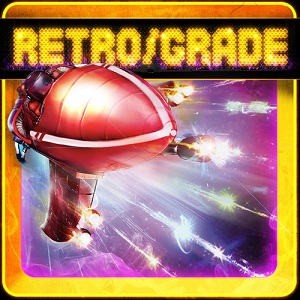
Retro/Grade is a video game developed by 24 Caret Games. The game is about ace pilot Rick Rocket, who must repeat his last space battle in reverse in order to protect the space time continuum. The game play is rhythm-based and timed to original music by Skyler McGlothlin. In January 2009, it was nominated for two Independent Games Festival awards: Excellence in Audio and Excellence in Design. In October 2010, it won the Audience Choice Award at IndieCade.

The PlayStation 4 (PS4) is a home video game console developed by Sony Interactive Entertainment. Announced as the successor to the PlayStation 3 in February 2013, it was launched on November 15, 2013, in North America, November 29, 2013, in Europe, South America, and Australia, and on February 22, 2014, in Japan. A console of the eighth generation, it competes with Microsoft's Xbox One and Nintendo's Wii U and Switch.

Guacamelee! is a Metroidvania action platforming video game developed and published by DrinkBox Studios, initially launched in April 2013 for platforms PlayStation 3 and PlayStation Vita and was later ported to Windows in August and to OS X and Linux in February 2014. The enhanced Super Turbo Championship Edition was released for Wii U, Windows, PlayStation 4, Xbox One, and Xbox 360 in July 2014 and later on the Nintendo Switch in October 2018. The game is inspired by traditional Mexican culture and folklore, like alebrijes and Day of the Dead.

The Xbox One is a home video game console developed by Microsoft. Announced in May 2013, it is the successor to Xbox 360 and the third console in the Xbox series. It was first released in North America, parts of Europe, Australia, and South America in November 2013 and in Japan, China, and other European countries in September 2014. It is the first Xbox game console to be released in China, specifically in the Shanghai Free-Trade Zone. Microsoft marketed the device as an "all-in-one entertainment system", hence the name "Xbox One". An eighth-generation console, it mainly competed against Sony's PlayStation 4 and Nintendo's Wii U and later the Switch.

Daylight is a survival horror video game developed by Zombie Studios and published by Atlus for Microsoft Windows and PlayStation 4. It was the first game to be powered by Unreal Engine 4.

A microconsole is a home video game console that is typically powered by low-cost computing hardware, making the console lower-priced compared to other home consoles on the market. The majority of microconsoles, with a few exceptions such as the PlayStation TV and OnLive Game System, are Android-based digital media players that are bundled with gamepads and marketed as gaming devices. Such microconsoles can be connected to the television to play video games downloaded from an application store such as Google Play.
Galak-Z: The Dimensional is a shooter video game developed and published by 17-Bit. It was released in August 2015 for the PlayStation 4 and October 2015 for Microsoft Windows, macOS and Linux. A Nintendo Switch port, subtitled Deluxe Edition, was released in March 2019 by Golem Entertainment. It was announced during Sony's pre-E3 2013 press conference in June 2013. 17-Bit CEO Jake Kazdal describes it as "modern Halo and Far Cry 3 combat in a 2-dimensional shell." Reflecting its inspiration in part by Japanese anime, the game is also known officially by the Japanese title of Uchuu Senshi Galak-Z.
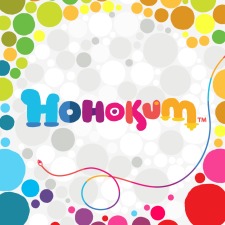
Hohokum is a 2014 art video game developed by Honeyslug and published by Sony Computer Entertainment for PlayStation 3, PlayStation 4, and PlayStation Vita, and by Annapurna Interactive for Microsoft Windows. The player controls a snake-like creature to explore 17 whimsical worlds with no set objectives. The developers, who began development in 2008, compared the concept to flying a kite and were inspired by free London museums, Portmeirion, and indigenous cultures. It was released on August 12, 2014, and features a soundtrack by Ghostly International artists. The game received "generally favorable reviews", according to video game review score aggregator Metacritic. Critics appreciated the game's presentation, including its art and music, but felt that the gameplay turned to drudgery towards its end and that the objectives were too vague.
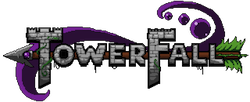
TowerFall is an action indie video game created by Maddy Thorson through her company Maddy Makes Games. In the game, players control up to four archers in a multiplayer platform fighter. It was released on the Ouya microconsole in June 2013 and was later ported to PlayStation 4, Xbox One, Linux, OS X, and Windows as TowerFall Ascension and to the Nintendo Switch under its original title of TowerFall.

Die Gute Fabrik is an independent game developer based in Copenhagen, Denmark. Founded in 2008 by artist Nils Deneken, and joined by game designers Douglas Wilson and Christoffer Holmgård, the studio was afterwards led by writer Hannah Nicklin.
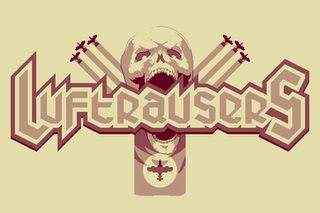
Luftrausers is a shoot 'em up video game developed by Netherlands-based indie developer studio Vlambeer and published by Devolver Digital for Microsoft Windows, OS X, Linux, PlayStation 3 and PlayStation Vita. It was released in March 2014 and ported to Android by General Arcade on May 28, 2015. A demake of the game, titled LuftrauserZ, was developed by Paul Koller for Commodore 64, Commodore 128 and Commodore 64 Games System, and released by RGCD and Vlambeer on December 8, 2017.

Wreckfest is a racing video game developed by Bugbear Entertainment and published by THQ Nordic. Wreckfest is described as the spiritual successor to the FlatOut series, which was created by Bugbear, and takes further inspiration from the Destruction Derby series and the cult 1989 racer Street Rod. A notable feature of the game engine is the use of soft-body damage modelling, which enables location-based damage that affects the driving dynamics of vehicles in a realistic fashion.
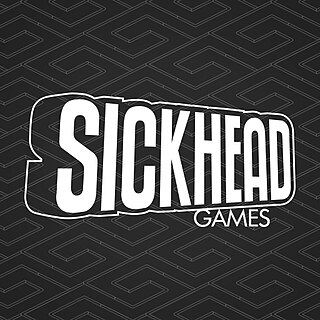
Sickhead Games, LLC is an American independent game development studio founded in 2002. It is best known for its multiplatform turn-based strategy game ARMED!, its involvement with the MonoGame framework and Torque series of game engines, and the development of several PlayStation 4/5, PlayStation Vita, Xbox One, and Nintendo Switch ports of indie games including TowerFall Ascension, Stardew Valley, Darkest Dungeon, Octodad: Dadliest Catch, Slay the Spire, and Axiom Verge. The studio has updated classic console and PC games from the late 1990s and early 2000s, including ExZeus, Enclave, and Grandia, to run on modern gaming systems.

Dreams is a game creation system video game developed by Media Molecule and published by Sony Interactive Entertainment for the PlayStation 4 in February 2020. Players can create and play user-generated content in the forms of games, audiovisual experiences and game assets, which can be shared or remixed to be used in other players' creations.

Always Sometimes Monsters is a role-playing video game created by Canadian indie developers Justin Amirkhani and Jake Reardon, developed by Vagabond Dog and published by Devolver Digital. The game was released on 21 May 2014 for Microsoft Windows. A later update using the MonoGame framework brought the game to OS X and Linux on 8 January 2015 and to iOS and Android on 28 May 2015.

Convoy is a video game released on April 21, 2015 for Microsoft Windows, OS X, and Linux, and as Convoy: A Tactical Roguelike on April 8, 2020 for Nintendo Switch, PlayStation 4, and Xbox One under a revised format. The game features pixel art graphics and roguelike squad based tactical combat. In Convoy, the player must scour the wastelands of a desert planet in a defensively outfitted semi-trailer truck for parts to a crashed spaceship. The plot is experienced through interactive text based dialogue, where the player picks responses to written scenarios. The outcome of these scenarios sometimes turns in to tactical combat.
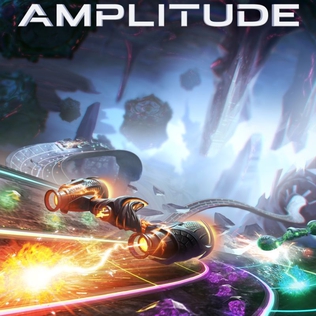
Amplitude is a 2016 music video game developed and published by Harmonix. As the reboot of Amplitude (2003), the game was released in 2016 for PlayStation 4 in January and for PlayStation 3 in April. The game received generally average reviews upon release.

Minit is an action-adventure video game developed by Jan Willem Nijman, Kitty Calis, Jukio Kallio, and Dominik Johann. The game is published by Devolver Digital and was released on April 3, 2018, for Windows, macOS, Linux, Xbox One, and PlayStation 4. On May 11, 2018, a Nintendo Switch version was announced on the first episode of Indie World, a web series from Nintendo of Japan that showcases indie games coming to the Japanese Nintendo eShop. It was released for the Nintendo Switch on August 9, 2018. It also came out for mobile devices in June 2019.
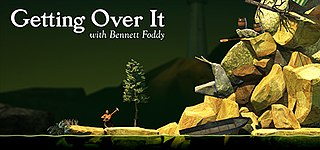
Getting Over It with Bennett Foddy is a platform game developed by the titular Bennett Foddy. The game was released as part of the October 2017 Humble Monthly, on October 6, 2017, where it went on to be played by over 2.7 million players. A Steam version of the game was later released by Foddy on December 6, 2017, with a release on iOS that same day. The Android version was later released on April 25, 2018. The Linux version was available for beta testing in August 2018 and received a stable release in the same year.

Exo One is a sci-fi adventure video game developed by Australian developer Exbleative and published by Future Friends Games for Xbox One, Xbox Series X/S, and Microsoft Windows via Steam, Epic Games Store, and Microsoft Store. The game launched on November 18, 2021. It launched on PlayStation 4 and PlayStation 5 on June 27, 2024.



















